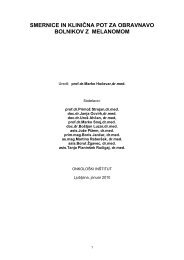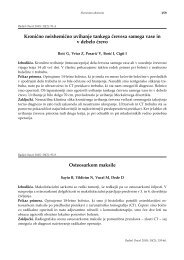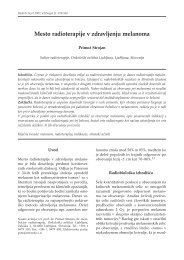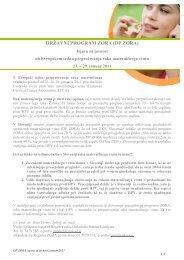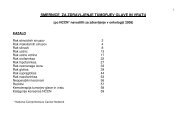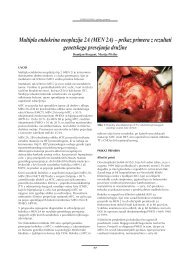You also want an ePaper? Increase the reach of your titles
YUMPU automatically turns print PDFs into web optimized ePapers that Google loves.
The role of tricyclic drugs in selective triggering of<br />
mitochondrially-mediated apoptosis in neoplastic glia:<br />
a therapeutic option in malignant glioma?<br />
G. J. Pilkington 1 , J. Akinwunmi 2 and S. Amar 1<br />
1<br />
Cellular & Molecular Neuro-Oncology Group, School of Pharmacy & Biomedical Sciences,<br />
Institute of Biomedical & Biomolecular Sciences, University of Portsmouth, White Swan<br />
Road, Portsmouth PO1 2DT and 2 Hurstwood Park Neurological Centre, Haywards Heath,<br />
West Sussex RH16 4EX<br />
We previously demonstrated that the tricyclic antidepressant, Clomipramine, exerts<br />
a concentration-dependant, tumour cell specific, pro-apoptotic effect on human<br />
glioma cells in vitro and that this effect is not mirrored in non-neoplastic human<br />
astrocytes (Rooprai et al Acta Neurochirurgica: 145: 145-148 2003). Moreover, the<br />
drug acts by triggering mitochondrially-mediated apoptosis by way of complex 3 of<br />
the respiratory chain. Here, through reduced reactive oxygen species and neoplastic<br />
cell specific, altered membrane potential, cytochrome c is realeased thereby activating<br />
a caspase pathway to apoptosis (Daley et al 2005). Similarly, the tricyclic analog,<br />
desipramine, has also been reported to induce mitochondrially-mediated apoptosis<br />
in C6 glioma cells via increased caspase-3 gene expression and intracellular calcium<br />
homeostasis changes (Qui et al Acta Pharmacol Sin 23: 803-807, 20<strong>02</strong>). In addition,<br />
while we and others have shown that further antidepressants, including those of<br />
the selective serotonin reuptake inhibitor (SSRI) group, also mediate cancer cell<br />
apoptosis in both glioma and lymphoma, clomipramine appears to be most effective<br />
in this context (Meredith et al The FASEB Journal (2005; published online May<br />
2005). Very recently, Levkovitz et al J Mol Neurosci 27: 29-42 (2005) independently<br />
reported that clomipramine, in a comparative study between SSRIs and clomipramine<br />
22l9<br />
in C6 rat glioma and human neuroblastoma cells, caused apoptosis preceded by<br />
a rapid increase in p-c-Jun levels, cytochrome c release from mitochondria and<br />
caspase-3-like activity. Significantly lower sensitivity to the drug’s pro-apoptotic<br />
activity was demonstrated in primary mouse brain and neuronal cultures. The<br />
authors therefore concluded – as we had previously - that the high sensitivity of<br />
cancer cells to the drug suggested that clomipramine may have potential in the<br />
treatment of brain tumours. In addition to clomipramine we have investigated<br />
the possible pro-apoptotic activity of a range of further tricyclic drugs. Only two<br />
such agents (amitriptyline and doxepin) showed a similar, or better, effect when<br />
compared with clomipramine. Since both orally administered clomipramine and<br />
amitriptyline are metabolised to desmethyl clomipramine (norclomipramine) and<br />
nortriptyline respectively it is necessary for testing at a tumour cell level to be carried<br />
out with both the parent tricyclic and the metabolic product. In addition, reversal<br />
of multidrug resistance in a number of solid cancers following treatment with both<br />
clomipramine and amitriptyline has been reported. This additional role for tricyclics<br />
may, albeit at differing concentrations, be of some significance in the treatment<br />
of primary and secondary brain tumours. Since a substantial number of patients<br />
with malignant glioma have already received and are receiving clomipramine, both



